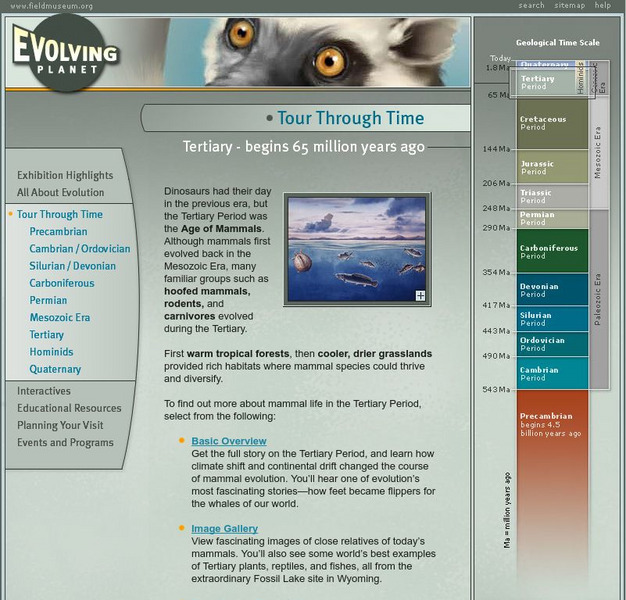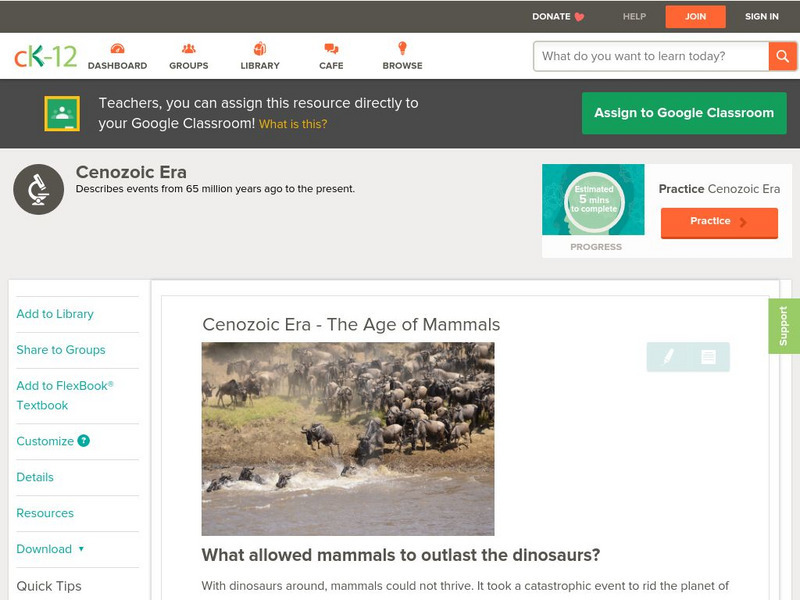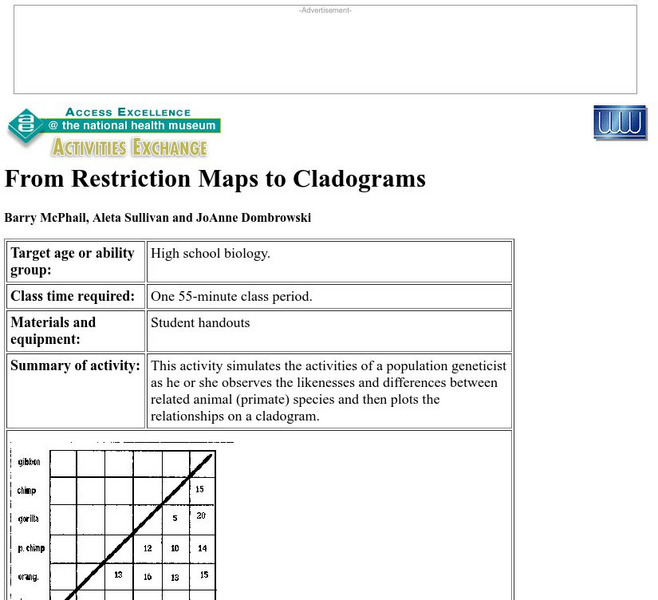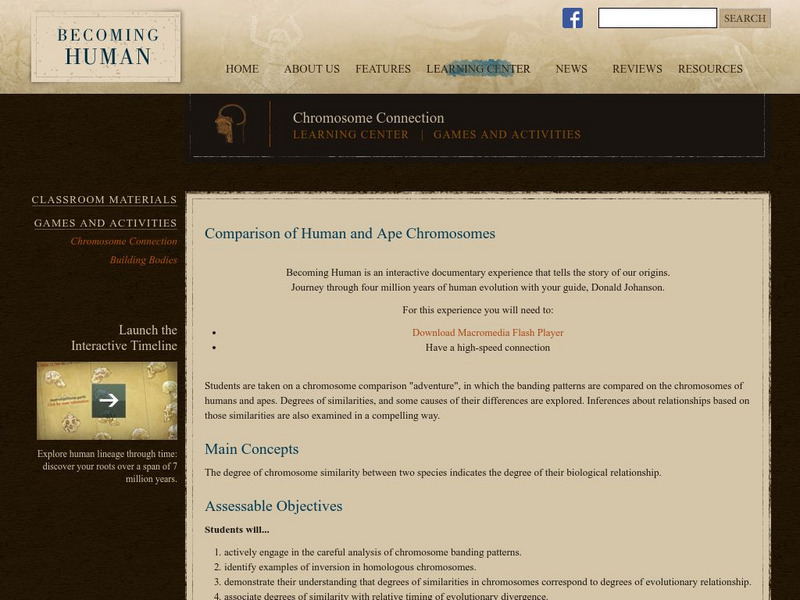Hi, what do you want to do?
Curated OER
Primate Evolution
In this primate evolution worksheet, students use an idea map showing how primates have evolved into the different groups to complete 1 true or false and 2 short answer questions.
Curated OER
Primate Evolution
In this primate evolution worksheet, students will compare 3 characteristics that all primates share. Then students will compare the traits of current primates to early man by completing 5 short answer questions.
Curated OER
Thumbs Up, Thumbs Down: Grasping the Idea of Evolution
Students compare and their performance of a series of tasks using their thumb and fingers to their performance of the same tasks without the use of their thumb. The class discussion that follows the activity defines and discusses the...
Curated OER
Primate Characteristics and Exaptation
Young scholars compare the features of gorilla to humans. In this biology activity, students simulate adaptation using materials found in the classroom. They explain what exaptation means.
Curated OER
Apes To Man
Learners study primates and their evolution history. In this role play lesson plan students view a video on evolution then demonstrate how primates walked and other observations they noticed in the film.
Curated OER
The Opposable Thumb
Students participate in an activity which helps them realize the importance of the opposable thumb through trying to live without it. The goal of this activity is for students to understand the physical importance of the opposable thumb.
Curated OER
Change Through Time
In this evolution worksheet, students will complete a table by writing in the era and biological event based on 4 different time periods of Earth's history. Students will answer 8 fill in the blank questions based on the different origin...
Curated OER
Invertebrates and Vertebrate Evolution
Students explore the major characteristics of the major animal phyla. They describe adaptive features that have contributed to the success of animals on land. Students explain how primate evolution provides a context for understanding...
Curated OER
The Opposable Thumb
Young scholars explore the physical importance of the opposable thumb among primates. They discover which of their simplest daily activities are possible only because of their opposable thumbs.
Educa Madrid
Prehistory
Images of the Atapuerca Caves, the cave paintings at Altamira, and a Neanderthal skull found at Forbes' Quarry on Gibraltar serve to introduce kids to prehistoric sites in Spain. Designed to support a study of prehistoric Spain, the...
Curated OER
Student Guide: Evolution Videodisk from Videodiscovery
Learners use this worksheet with the videodisk from Video discovery titled Evolution: Inquiries into Biology and Earth Science.Written because there is no computerized control program available, it is to be used with a standard videodisk...
Curated OER
Exploring Learned and Innate Behavior
Compare and contrast learned and innate behaviors between humans and primates. Your biology class members read articles and participate in discussions about the use of tools and communication methods. That's about it, you'll probably...
Curated OER
Dolphin Brains
Students listen to an interview with Lori Marino regarding the development of dolphin brains and read a summarizing text. They conduct further research and participate in class discussion.
Curated OER
Hominoid Skull Comparison
Students are provided with evidence used to support evolutionary theory. They are introduced to classification by using primates as an example. Students read article related to Hominoid Skull Comparison and write a summary about the...
Curated OER
Human Ancestry
In this human ancestry worksheet, students will answer questions about hominids, "Lucy", and the emergence of modern humans. Then students will compare the characteristics of Neanderthals and Cro-Magnons. This worksheet has four short...
Curated OER
Cladistics Is a Zip...Baggie
Students explore how the grouping of organisms based on their shared derived characters forms the basis of a cladogram.
Curated OER
Homology: Where Does The Evidence Lead
Students are introduced to the topic of homology. In groups, they read a case study and compare different drawings of early vertebrate emryos. They work together to answer discussion questions and label the various parts of each embryo.
Curated OER
Nuts & Bolts: is Classification, Arbitrary, Or Not?
Middle schoolers, in groups, classify furniture, share their categories and rationales, then note how their different schemes vary, perfectly logical and useful, but completely arbitrary.
Curated OER
Prehistory: Our Ancestors Emerge
In this prehsitory worksheet, students read a 3-page article about antropological finds and then respond to 2 short answer questions based on the article.
National Health Museum
Access Excellence: Molecular Biology/primate Phylogeny
This lesson plan involves comparison of amino acids to create a phylogenetic tree of primates. Students will also use other species information to draw conclusions about evolutionary relationships.
The Field Museum
Field Museum: Exhibits: Evolving Planet: Tertiary
Delve into the Tertiary Period portion of the Evolving Planet exhibit, and trace the climate and continental shift during this time. Includes an overview of the period, a collection of images, and a look at the Tertiary Period's...
CK-12 Foundation
Ck 12: Biology: Cenozoic Era the Age of Mammals
[Free Registration/Login may be required to access all resource tools.] Covers the Cenozoic Era, the age of mammals.
National Health Museum
Nhm: Restriction Maps to Cladograms Lesson
This lesson plan requires students to analyze DNA restriction maps to determine the differences in the sequence for several primates and humans. They then use the information to create a cladogram.
Other
Becoming Human: Comparison of Human and Ape Chromosones
Have you ever wondered how closely we are related to other primates? Join this chromosone comparison adventure to compare the banding patterns of human chromosones to those of apes.




























